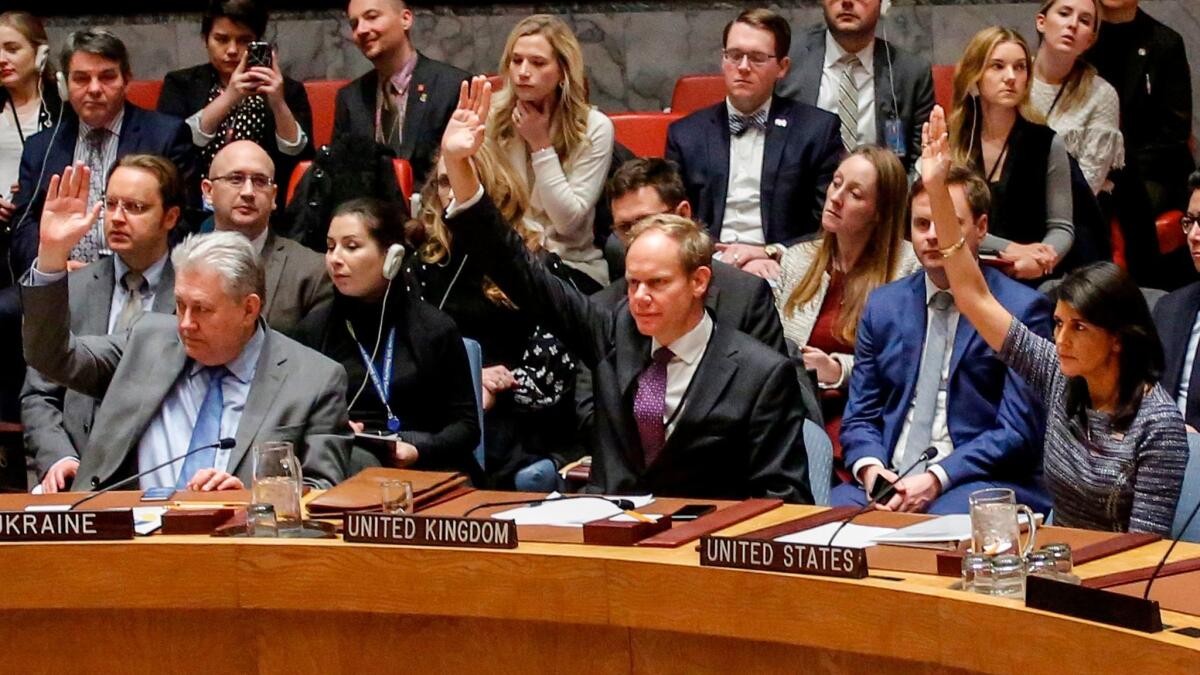Taiwan investigators say ship transferred oil to North Korea in defiance of sanctions

- Share via
Reporting from TAIPEI, Taiwan — Taiwanese authorities are investigating a local fishing company owner who is suspected of helping arrange the transfer of fuel oil to North Korea in defiance of international sanctions.
The case, if proved, would reveal a type of undercover deal that experts say periodically takes place in Asia despite a growing list of economic sanctions imposed on North Korea to pressure the country to quit testing long-range missiles.
President Trump said via Twitter on Friday that China had been “caught RED HANDED” for “allowing oil to go into North Korea.” His tweet came after a South Korean newspaper reported that U.S. spy satellite images showed Chinese ships transferring oil to North Korean ships on the high seas in October. South Korean authorities seized one ship, which was registered in the Chinese territory of Hong Kong.
The district prosecutor’s office in Taiwan’s major southern port city of Kaohsiung said it had launched its inquiry on Saturday after Taiwan’s Justice Ministry brought to its attention a South Korean media report linking a Taiwanese company to ships registered in Hong Kong.
The fishing company owner, identified by authorities only as a 54-year-old with the surname Chen, posted bail of about $50,700 and was ordered not to leave Taiwan. Prosecutors questioned him this week and said they would keep investigating.
Six people from the prosecutor’s office “discovered after questioning that defendant Chen in 2017 had knowingly used ships to sell petroleum products on the high seas and had falsely written Hong Kong as the destination on the export declaration,” the prosecutor’s office said in a statement.
The Kaohsiung-based company had leased a freighter for the cargo, the statement said. The freighter is believed to have sent oil to vessels bound for North Korea, it said. The statement does not say whether that ship was the one seized or among those spotted by satellites. (Authorities did not identify the company in full, leaving off two Chinese characters from its name.)
Chen knew the freighter was selling oil on the open seas instead of going to Hong Kong, the prosecutor’s office added.
The United Nations Security Council, which includes China, has agreed to restrict fuel shipments to North Korea. Trump protested to isolated, diplomatically scorned Pyongyang repeatedly last year about its 15 missiles tests. He has repeatedly belittled North Korean Kim Jong Un and in his U.N. address in September called him a “Rocket Man … on a suicide mission.”
Trump has urged China, a long-standing communist ally of North Korea’s, to help curb North Korean weapons development.
Taiwan is not a United Nations member, but President Tsai Ing-wen’s office said in November her government would comply with North Korea-related Security Council agreements, including sanctions. In September the Security Council banned ship-to-ship trade with North Korea.
Taiwan supports the U.N. resolutions to please the United States, said Liang Kuo-yuan, president of the Taipei-based think tank Polaris Research Institute. The United States is a staunch informal ally of Taiwan’s and a major trading partner. But “there are private relations, business to business,” between Taiwan and North Korea, Liang said.
Government trade figures show Taiwan received about $2 million in imports from North Korea in the first 10 months of 2017 and made $45,495 in exports. In the same period of 2016, Taiwan accepted $11.9 million in imports from North Korea and made exports worth $495,137.
Taiwan would not be the only source of undercover trade with North Korea, said Song Seng Wun, an economist with the private banking unit of CIMB in Singapore. Shippers of goods from Southeast Asia sometimes secretly send supplies to North Korea via the recipient country’s chief benefactor, China, he said.
Sellers are drawn by the high prices North Korea must pay as sanctions make imports hard to find, Song said.
“North Korea would have to pay you well for goods and services, and when you offer an attractive enough price, there will always be someone to sell,” he said.
Jennings is a special correspondent.
More to Read
Sign up for Essential California
The most important California stories and recommendations in your inbox every morning.
You may occasionally receive promotional content from the Los Angeles Times.










